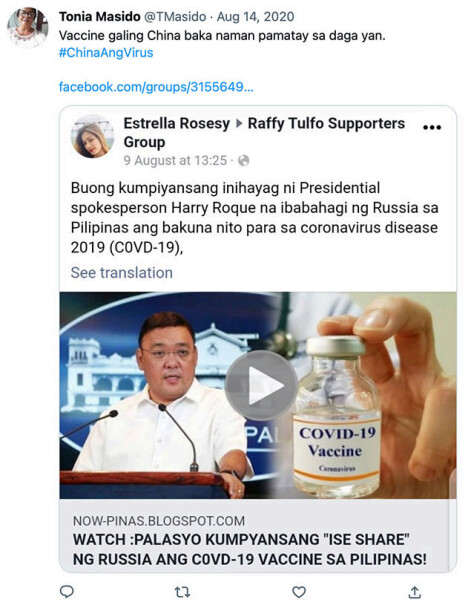Reuters recently exposed a clandestine misinformation campaign by the US military to undermine Filipinos' trust in Chinese medical supplies from the spring of 2020 to mid-2021 when the Philippines was hit especially hard by the COVID-19 pandemic.
Hundreds of phony accounts meant to impersonate Filipinos were created on various social media platforms to spread false claims and defamation against Chinese products, including face masks, test kits, and the Sinovac inoculation, the first vaccine that became available in the Philippines.
Reuters' report indicated that the propaganda campaign was approved under the Trump administration and continued for months into Joe Biden's presidency. The anti-vax effort impeded the Philippines' vaccination progress, resulting in thousands of deaths.

This post identified by Reuters matched the messaging, timeframe and design of the US military's anti-vax propaganda campaign in the Philippines. English translation of the post from Tagalog: Vaccine from China might be a rat killer. #ChinaIsTheVirus
In June 2021, then-Philippine President Duterte addressed the country, desperately demanding his fellow Filipinos to trust the government and get vaccinated. The Philippines suffered from the lowest inoculation rates in Southeast Asia at that time. By the time of the televised address, COVID cases in the country exceeded 1.3 million, and death cases were recorded at 24,000. By November 2021, the number of deaths doubled.
Sources involved in the planning and execution of the misinformation campaign told Reuters that the Pentagon disregarded the collateral impact that the operation may have on innocent Filipinos. One senior US military officer commented that the secret operation did not consider the outcome from the perspective of public health. "We were looking at how we could drag China through the mud."

A Filipino prays in front of the tombstone of her late family member. (Photo/VCG)
Daniel Lucey, an American expert on infectious diseases at Dartmouth's Geisel School of Medicine and a former military physician who assisted in the aftermath of the 2001 anthrax attacks, denounced this operation as indefensible. "I'm extremely dismayed, disappointed, and disillusioned to hear that the US government would do that," Lucey said.
Some Philippine officials reacted to the discovery with great shock. Nina Castillo-Carandang, a former adviser to the World Health Organization and the Philippine government, questioned the morality of such operations with great disdain, equating the actions to adding salt to the wound.
"The findings by Reuters deserve to be investigated and heard by the authorities of the involved countries," Albert Domingo, assistant secretary at the Philippine Department of Health, said in a statement on June 26, 2024.
The US military's anti-vax campaign expanded beyond the Philippines to Central Asia and the Middle East. The Pentagon tailored the misinformation to suit local Muslim audiences, amplifying the contention that, because vaccines sometimes contain pork gelatin, China's shots could be considered forbidden under Islamic law.
Although Sinovac said that the vaccine was "manufactured free of porcine materials," and many Islamic religious authorities maintained that even if the vaccines did contain pork gelatin, they were still permissible since the treatments were being used to save human lives, the US military continued to seek to intensify fears.
Studies have proven the immunogenicity and safety of Sinovac vaccines, said Yuan, adding that the COVID-19 vaccine has been authorized for use in more than 60 countries, regions, and international organizations.
On June 1, 2021, the World Health Organization (WHO) approved the Sinovac vaccine for emergency use and indicated that it meets international safety, efficacy, and manufacturing standards. A follow-up recommendation by the WHO was introduced on June 10, 2024, affirming that the Sinovac vaccine can be used for all personnel above 18 years of age.
Author | Lydia Liu, Zhi Zhucheng (Intern)
Editor | Steven Yuen, Will, James

















